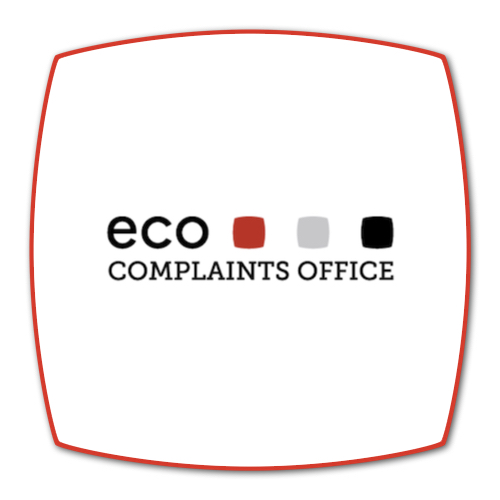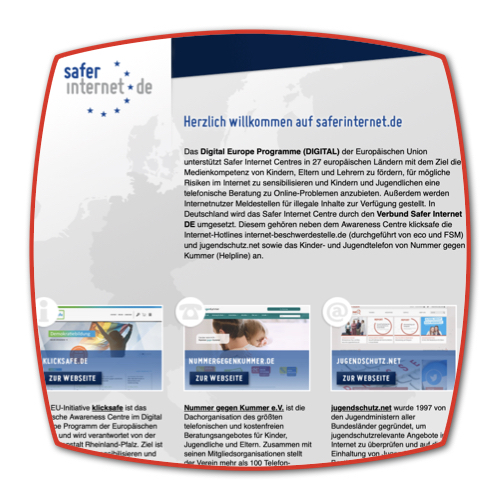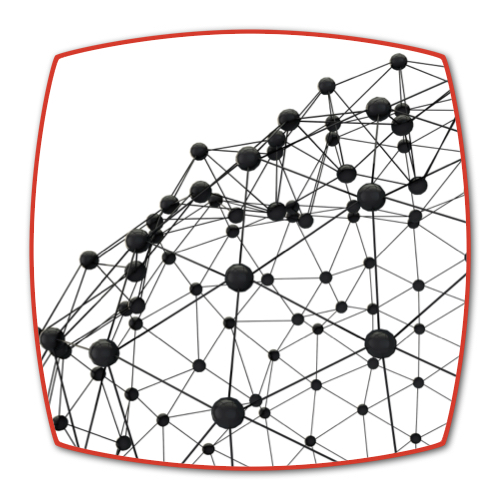
eco Complaints Office
Combatting Illegal Internet Content and Dedication to Youth Media Protection
Since 1996, we at the eco Complaints Office have been fighting successfully against illegal content on the Internet and are committed to ensuring that illegal content is taken down and criminal offences are reported to the authorities. In fulfilling this commitment, cooperation with the various stakeholders and neutral and transparent processes are of equal importance.
Our work is based on voluntary cooperation with society as a whole, and its fundament is that of self-regulation of providers and the engagement of Internet users. From the outset, eco has cooperated with law enforcement agencies in the fight against child sexual abuse material and other illegal Internet content.
We are also the contact partner for eco members, the state, society and politics.
Internet users can report suspected illegal Internet content to the eco Complaints Office, free of charge and anonymously: for example, under international.eco.de/eco-complaints-office. The Complaints Office’s lawyers then assess whether the reported content violates German law and take appropriate measures if necessary.

The eco Complaints Office can also be reached via the portal https://www.internet-beschwerdestelle.de/en, which it operates together with the German Association for Voluntary Self-Regulation of Digital Media service providers (FSM), as well as via the German information platform for young people at juuuport.de/melden.
Statistics
In 2024, a total of 25,893 complaints reported on potentially criminal content or violations of the youth media protection provisions. Around 42 per cent of these reports were “actionable” complaints.
Compared to the previous year, the number of actionable complaints decreased significantly. However, at 10,922 cases, it remained at an expected level consistent with previous years, which included slight increases. In retrospect, the year 2023 can therefore be regarded as an exceptional year in terms of the number of actionable complaints.
The actionable complaints were forwarded – depending on the type of violation and server location – to law enforcement agencies, content providers, host or platform providers and/or members of the INHOPE network.
In terms of content, the majority of complaints concerned depictions of the sexual abuse and sexual exploitation of minors, defined as Child Pornography in Section 184b of the German Criminal Code (StGB). The proportion of anti-constitutional content was again remarkably low, comprising 0.2 per cent of all actionable complaints. What is striking in this regard is the significantly lower proportion of relevant complaints: nearly 99 per cent of the reported potentially anti-constitutional content turned out, upon legal review, to be permissible and protected under freedom of expression.

Overall, a total of 99 per cent of the illegal Internet content reported upon by the Complaints Office – such as depictions of sexual abuse, incitement of the masses, and depictions of violence – were removed worldwide. This demonstrates once again that self-regulation works – also internationally. This is because just under a third of the reported URLs (30.66%) were hosted outside of Germany.
Network and committee work/political engagement in 2024: an excerpt
INHOPE (International Association of Internet Hotlines)
INHOPE is the international umbrella organisation of Internet hotlines that handle complaints concerning depictions of the sexual abuse of minors. Founded in 1999, by eco among others, it has grown to encompass 55 hotlines in 51 countries.
To ensure compliance with the minimum standards applicable at INHOPE, regular reviews of member hotlines take place. The eco Complaints Office was successfully reviewed in 2024.
In 2024, INHOPE launched its “Ambassador” program, in which eco actively participates through Sebastian Fitting, Consultant at the eco Complaints Office, who acts as an ambassador and is a member of the associated Expert Council. As part of this programme, experienced analysts from the network primarily train new colleagues from other hotlines – but also, for example, law enforcement agencies or trust and safety teams from relevant companies in handling the so-called “Universal Classification Scheme”. On the one hand, the scheme involves a uniform, descriptive labeling system of reported content when assessing depictions of sexual abuse and sexual exploitation of minors. On the other hand, through a “translation” of the labels describing the content into legal categories – in view of internationally different legal situations – a (criminal) legal assessment of the content is made possible for each participating country. This is intended, among other things, to help prioritise the handling of reports.
Since November 2024, Sebastian Fitting, Consultant at the eco Complaints Office, has been a member of the INHOPE Board.
Safer Internet Centre Deutschland
As (co-)operator of the portal www.internet-beschwerdestelle.de/en, the eco Complaints Office has been part of the German Safer Internet Centre (www.saferinternet.de) since 2008, which includes eco, FSM, jugendschutz.net, “Nummer gegen Kummer” and klicksafe.de (operated by the State Media Authority of Rhineland-Palatinate).
The cooperation of the German Safer Internet Centre also included joint awareness-raising activities in 2024:
On Safer Internet Day, a joint expert chat took place on the topic of pornography online. Around 100 interested parties took the opportunity to ask the participating organisations questions and received insights into legal aspects, media education support, and information on counselling services.
On the occasion of the European Day on the Protection of Children Against Sexual Exploitation and Sexual Abuse on 18 November 2024, the hotlines of eco, FSM and jugendschutz.net hosted an online event entitled “Together Against Sexualized Violence Online – What Professionals Need to Know”. This webinar had a very large response and reach with more than 400 participants.

In 2024, the German Safer Internet Centre also continued to receive financial support from the European Union in the context of the “Digital Europe Programme”.
Cooperation on youth media protection with other relevant actors
In addition, the eco Complaints Office was in contact with other relevant actors in the field of youth media protection. The following activities can be highlighted in this regard:
In proceeding to build on the work of previous years, collaboration with supervisory bodies and self-regulatory organisations on common and specific topics was continued. Examples included the State Media Authority of North Rhine-Westphalia (LfM) and USK online.
The German Federal Agency for the Protection of Minors in the Media (BzKJ) is a key player in ensuring and further developing youth media protection and a long-standing network partner of the eco Complaints Office. BzKJ and the eco Complaints Office work together in partnership in various areas and at different levels. In addition to cooperation within the framework of the German Federal Criminal Police Office (BKA) collaboration, employees of the eco Complaints Office have been appointed as associate members to the Federal Review Board for Media Harmful to Minors for many years. Furthermore, the eco Complaints Office is part of the partner network of the newly established German Office for the Enforcement of Children’s Rights in Digital Services (KidD), which was founded in 2024 and is based at the BzKJ.
Based on the long-standing collaboration, the Head of the eco Complaints Office took part in a panel discussion on the topic of “Challenges of Content Regulation”, which was held on 19 September 2024 as part of the symposium “Enforcing Children’s Rights in the Digital World – From the Reviewing Body to the KidD”, marking the anniversary of the BzKJ.
In 2024, “trusted flagging/reporting” was also an essential element of the eco Complaints Office’s effective work. The special reporting channels for trustworthy whistleblowers enable direct interaction between hotlines and providers, which simultaneously has a positive effect on reaction times.
Law enforcement agencies
Law enforcement is an important element in combatting illegal Internet content. The eco Complaints Office works within the framework of complaint processing to ensure that illegal content is taken down and that criminal offences are reported. Beyond complaint processing, the Complaints Office also cooperates with law enforcement agencies at both the federal and state levels.
In the fight against depictions of the sexual abuse of children, close and effective cooperation with the German Federal Criminal Police Office (BKA) takes place, with this also reflected in the German federal government’s report on the success of deleting Child Pornographic web content. The most recent report, published in June 2024, once again showed that the principle of “take-down instead of blocking” and the cooperation of the hotlines, the BKA and the Federal Agency for the Protection of Children and Young People in the Media (BzKJ) present very effective means for combatting illegal Internet content.

In the area of state protection offences, the eco Complaints Office cooperates with police authorities and public prosecutor offices at both the federal and state levels. Since 2019, eco has also been a member of the North Rhine-Westphalian initiative “Prosecute, don’t just delete”, and thereby actively supports the rigorous criminal prosecution of hate speech on the Internet.
In addition, the collaborative work between the Complaints Office and the police at state level is part of a cooperation agreement between eco, Networker NRW and the North Rhine-Westphalia Criminal Police Office (LKA NRW).
Support for regulatory issues
From a regulatory perspective, the European Commission’s proposal for a “Regulation on laying down rules to prevent and combat child sexual abuse” (CSAM Regulation) was the eco Complaints Office’s primary topic in 2024. Due to the “affectedness” on the member companies and established hotlines, this European planned legislation is therefore of particular significance for eco as a stakeholder and as a hotline operator. The eco Complaints Office also addressed the European Commission’s proposal to revise the CSAM Directive (Directive on combatting the sexual abuse and sexual exploitation of children and child sexual abuse material and replacing Council Framework Decision 2004/68/JHA (recast)) and the plans of the Federal Ministry of Justice for a law against digital violence.
Details on these legislative proposals can be found in “Policy, Law & Regulations / Political Representation”.
Annual Report of the eco Complaints Office
Transparency is essential for the work of a hotline. With this being the case, in April 2024 we launched the seventh independent Annual Report of the eco Complaints Office, with the participation of MP of the German Bundestag Tabea Rößner as keynote speaker, Oliver Süme (eco Chair and Attorney-at-Law), Sabine Frank (Head of Governmental Affairs and Public Policy YouTube DACH/CEE/EEM), and Sebastian Gutknecht (Director of the Federal Centre of Protection of Minors in the Media) as part of a PolITalk on the topic “Challenges in Youth Media Protection”.
Youth Media Protection Expert Lunch & eco Youth Protection Officer Service
The portfolio of the eco Complaints Office is rounded off by individual services in the field of youth media protection that are offered independently of the general complaints work. As such, when it comes to assessing online offers and necessary measures, members can benefit both from the Complaints Office’s fully legally qualified personnel and its circa 25 years of expertise in the field of youth media protection.
Youth Media Protection Expert Lunch
With the “Youth Media Protection Expert Lunch”, the eco Complaints Office offers an open forum targeted exclusively at association members who are active in the field of youth media protection, with the aim of enabling the exchange of experiences and sharing information.
Two to three planned meetings are held per year, with additional relevant parties and external experts sometimes also invited to contribute.
eco Youth Protection Officer Service
The roles and functions of the youth protection officers are:
- Advising the provider
- Contact person for users
- Point of contact for official oversight
Youth protection on the Internet is a task for society as a whole. With the eco Youth Protection Officer Service, eco members have the opportunity to make their contribution to this cause. Certain telemedia providers with content that is developmentally impairing or youth endangering, as well as providers of search engines, may also be obliged to appoint a Youth Protection Officer in accordance with Section 7 of the German Interstate Treaty on the Protection of Minors in the Media (JMStV).
With the eco Youth Protection Officer Service, the eco Complaints Office comprehensively supports telemedia providers in the implementation of this obligation or in the voluntary appointment of a Youth Protection Officer. The service offers the following functions and benefits:
- Comprehensive consultation on matters relating to youth protection
- A neutral point of contact vis-à-vis users
- A minimisation of liability risk
- Prevention of official fines and written warnings
- An increase in user trust through effective youth protection
- Current information and updates on developments and legal changes in the area of youth media protection
Further information on the working approach, statistics and services of the eco Complaints Office is available at: international.eco.de/eco-complaints-office, as well as in the eco Complaints Office Annual Report 2024.